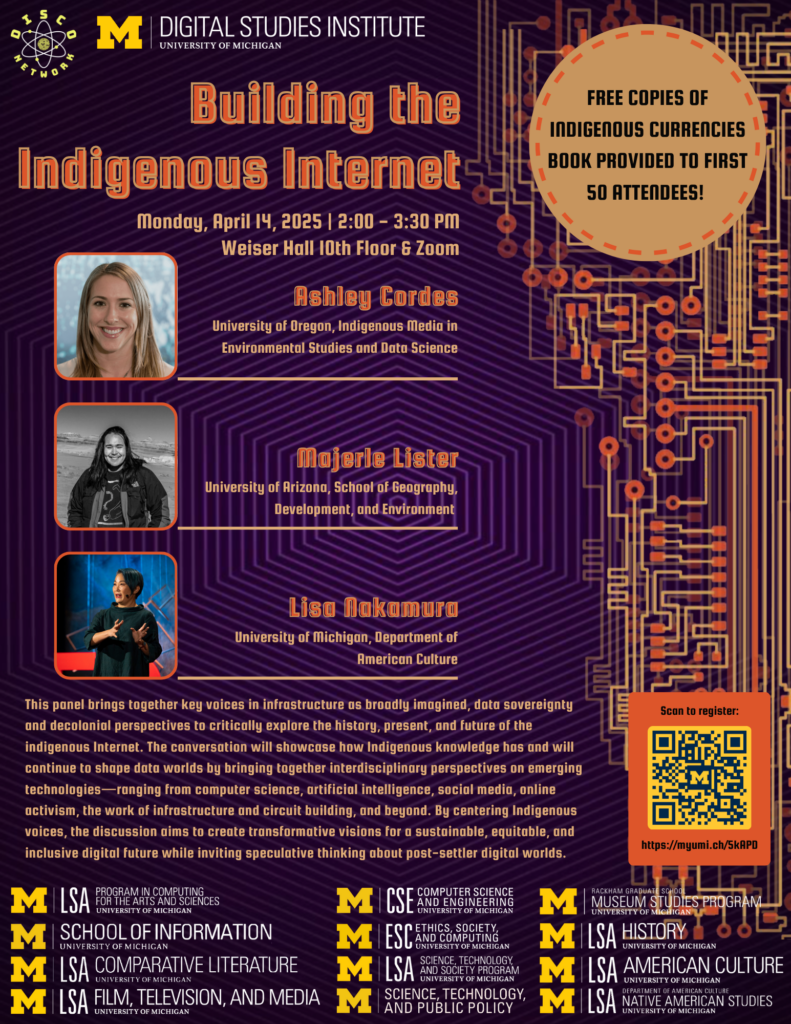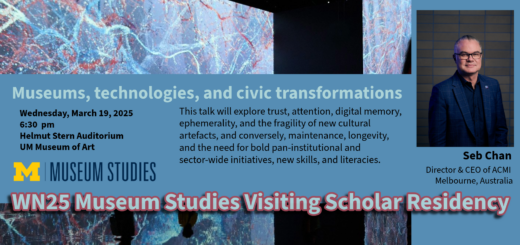Public programs facilitate dialogue between academics and professionals, informing scholarship and strengthening practice.
Multiple day conferences, year-long colloquia, individual lectures, “conversations” between individuals, hands-on workshops, and Museums at Noon talks featuring our graduate students all contribute to the remarkable richness of MSP offerings.
Video recordings of some MSP lectures are archived for viewing in our Media Gallery.

DISCO Network Presents: Building the Indigenous Internet
April 14 @ 2:00 pm - 3:30 pm
Date: April 14
Time: 2:00 – 3:30 pm
Location: 10th Floor Weiser Hall & Zoom
This panel brings together key voices in infrastructure as broadly imagined, data sovereignty and decolonial perspectives to critically explore the history, present, and future of the indigenous Internet. The conversation will showcase how Indigenous knowledge has and will continue to shape data worlds by bringing together interdisciplinary perspectives on emerging technologies—ranging from computer science, artificial intelligence, social media, online activism, the work of infrastructure and circuit building, and beyond. By centering Indigenous voices, the discussion aims to create transformative visions for a sustainable, equitable, and inclusive digital future while inviting speculative thinking about post-settler digital worlds.
Free copies of Indigenous Currencies: Leaving Some for the Rest in the Digital Age by Ashley Cordes will be provided to the first 50 attendees. All are welcome and we strongly encourage undergraduate and graduate students to attend. Advance registration is recommended:
- Register to attend in person: https://myumi.ch/N6wx9
- Register to attend on Zoom: https://myumi.ch/egDpX
Meet the Panelists
Ashley Cordes (Coquille/KōKwel) is an Assistant Professor of Indigenous Media in ENVS and Data Science at the University of Oregon and a recent American Council of Learned Societies Fellow. Her research lies at the intersection of Indigenous science and technology studies, digital media, and environmental/place-based studies. She is interested in how Indigenous culture and technology producers leverage discursive, technological, and media forms of “digital Indigeneity” toward Tribal economic independence, representational and data sovereignty, Indigenous cultural revitalization, and the resurgence of Indigenous knowledge systems. Her research in AI has been published in the Indigenous Protocols Artificial Intelligence position paper and her other works on representation, digital humanities, and Indigenous methods have been published in journals such as Cultural Studies >Critical Methodologies, Journal of International and Intercultural Communication, and Feminist Media Studies. She is the author of the book, Indigenous Currencies: Leaving Some for the Rest in the Digital Age in production with MIT Press.
Majerle Lister is a Diné student whose research interest ranges from Indigenous geography, Native American Studies, and Critical Agrarian Studies. Focusing on land regimes in the Navajo Nation, he is interested in how land relations are shaped by development projects and historical Diné land relations and practices. His research explores the development discourses and practices within the Former Bennett Freeze Area in Western Navajo Nation.
Lisa Nakamura is the Gwendolyn Calvert Baker Collegiate Professor in the Department of American Culture, and the founding Director of the Digital Studies Institute at the University of Michigan, Ann Arbor. Since 1994, Nakamura has written books and articles on digital bodies, race, and gender in online environments, on toxicity in video game culture, and the many reasons that Internet research needs ethnic and gender studies. These books include, Race After the Internet (co-edited with Peter Chow-White, Routledge, 2011); Digitizing Race: Visual Cultures of the Internet (Minnesota, 2007); Cybertypes: Race, Ethnicity, and Identity on the Internet (Routledge, 2002); and Race in Cyberspace (co-edited with Beth Kolko and Gil Rodman, Routledge, 2000). In November 2019, Nakamura gave a TED NYC talk about her research called “The Internet is a Trash Fire. Here’s How to Fix It.”
Co-Sponsors:
Center for Ethics, Society, and Computing
Computer Science and Engineering
Department of American Culture
Department of Comparative Literature
Department of Film, Television, and Media
Department of History
Museum Studies Program
Native American Studies
Program in Computing for the Arts and Sciences
Science, Technology & Society Program
Science, Technology, and Public Policy Program
School of Information
Additional information can be found here.



